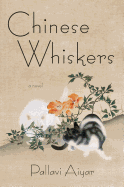
Two cats living disparate lives in modern Beijing narrate Pallavi Aiyar's imaginative Chinese Whiskers. Soyabean is a male "only kitten" smothered by the love of his mother and by Nai Nai, a widowed 80-year-old and the eldest member of the middle-class Xu household, which is undergoing a multigenerational tug-of-war. "All that is good in China and noble about being Chinese they reject," Nai Nai complains, referring to her son's and grandson's mockery of great poets, the Peking Opera and even calligraphy. After Soyabean is sold to wealthy foreigners who fawn over his beauty, Nai Nai's spoiled adult grandson hatches a get-rich-quick scheme whereby Soyabean becomes a model for a gourmet cat food company.
In a parallel plot, Tofu, a female kitten, "a dustbin cat," is one of five siblings roughing it on the streets of Beijing. Tofu's family once lived with a Manchu nobleman who served their suppers on silver plates. The communist revolution destroyed the nobleman's wealth and, ultimately, the cats became strays. When a woman from the Cat Protection Society rescues skinny, street-smart Tofu, she places her with the wealthy foreigners who adopted Soyabean.
The paired house cats come to share a loving, pampered existence until their domestic bliss is complicated by the SARS virus epidemic, a tainted pet-food scandal and Tofu's sudden disappearance. Sketched illustrations and regional language references enrich Aiyar's suspense-filled novel, a gentle morality tale about "Old China" versus "New China." --Kathleen Gerard, blogger at Reading Between the Lines

